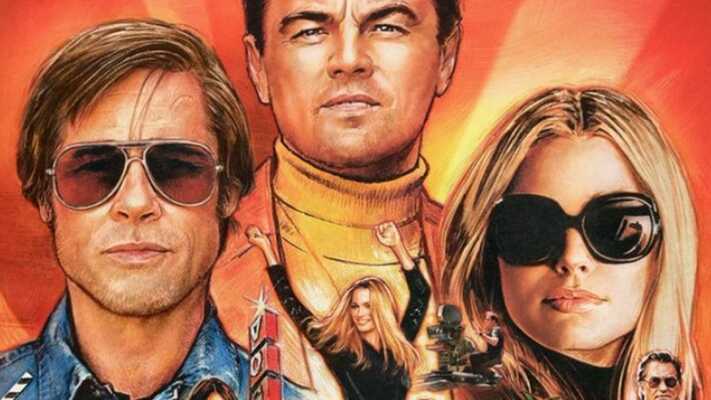Review: ONCE UPON A TIME IN HOLLYWOOD

“It’s official old buddy, I’m a has-been.”
Those words come from Leonardo DiCaprio’s emotional and radically insecure fading star Rick Dalton at the start of Quentin Tarantino’s 9th film, ONCE UPON A TIME IN HOLLYWOOD which opened this weekend, and serve as the catharsis of not only the character himself, but the overwhelming tone of a film that stands as Tarantino’s most shockingly refined and uncharacteristically subdued film that serves as a 60’s fairy-tale and, in many ways, a love story about why we love movies.
It’s a film that sees the cinephile and grindhouse junkie director/writer dial back his token violence, gaudy exhibitionism, and page-long monologues for something that is as nuanced and focused as it is plodding and devoid of direction. A film which is as narratively bare-bones as it is conceptually complex, exploring three days over the course of 1969, an era which ended abruptly in bloodshed with the horrific slaughter of pregnant actress Sharon Tate and her friends on Cielo Drive.
HOLLYWOOD follows fading western TV star Rick Dalton (DiCaprio in a career best) and his best-friend, handyman, and stunt double Cliff Booth, played by a stoic and stone-faced Brad Pitt as they find their lives heading towards irrelevancy until Dalton’s new neighbors, director Roman Polanski and his actress-wife Sharon Tate (Margot Robbie), move in. What happens over the course of this nearly 3hr fable is hard to explain, and easy to watch.
The film, essentially, is a series of vignettes that follow Rick, Cliff, and Sharon Tate through their daily lives. It ranges from laugh-out-loud hilarity to scenes that have an all-too-powerful emotional punch as we see ourselves on the faces of DiCaprio and Pitt. HOLLYWOOD capitalizes on our fears of fading into obscurity, our treasuring of friendship, and our self-doubts while at the same time letting us fall as in love with Margot Robbie’s Sharon Tate as Mr. Tarantino seems to have done with her real-life counterpart.
There’s a ghostly passion and sinister undertone as we see the Manson family going through their routine of diving for garbage and soaking up TV on their couch at the Spahn Movie Ranch while we also follow Robbie, nearly wordless, through the life of Sharon Tate.
Her huge smile, lively and expressive eyes, platinum blonde hair, and bronzed skin show us an angel. A work of art. A light that was tragically extinguished. Without going into full spoilers, the film’s climax is almost more devastating than reality because it seems to come through a place of genuine sadness and hopefulness from Tarantino. Much as we all have fallen in love and had our hearts broken by reality, the film seems to be Tarantino’s outlet for a hypothetical world where the good guys win shown to a world that is all too used to seeing them fail.
The title tells you all you need to know going in. This is a fairy-tale. An artist’s love-letter to cinema and to a culture that was massacred. A time long gone. There are the heroic knights (Dalton and Booth), the beautiful princess in her California castle (Tate) and their kingdom under siege by a dark power that moves silently but with malice and ferocity.
The latter is exemplified heavily by one particularly chilling and depressing scene where Pitt’s Booth visits Manson’s ranch, fondly remembering his time there when it was a Hollywood stunt-lot. The scene is shot like a western, Tarantino’s favorite genre, as Cliff Booth’s moccasins crunch the sand while the demon Manson children begin to walk out to observe him in eerie silence. All Booth wants to do is see an old friend, to be reminded of a time when he was relevant…and the result is darkly comical in broad strokes and heart-wrenching in finer detail.
Populated by an all-star cast and with Tarantino’s most meaningful script to date, HOLLYWOOD is a work of art that is, especially, a treasure in a world of remakes and sequels that seemed to have played just a deadly hand in the death of Hollywood as Charles Manson himself.
Please support The Blackwell Journal-Tribune by subscribing today!
%> "
 Loading...
Loading...
.png)
